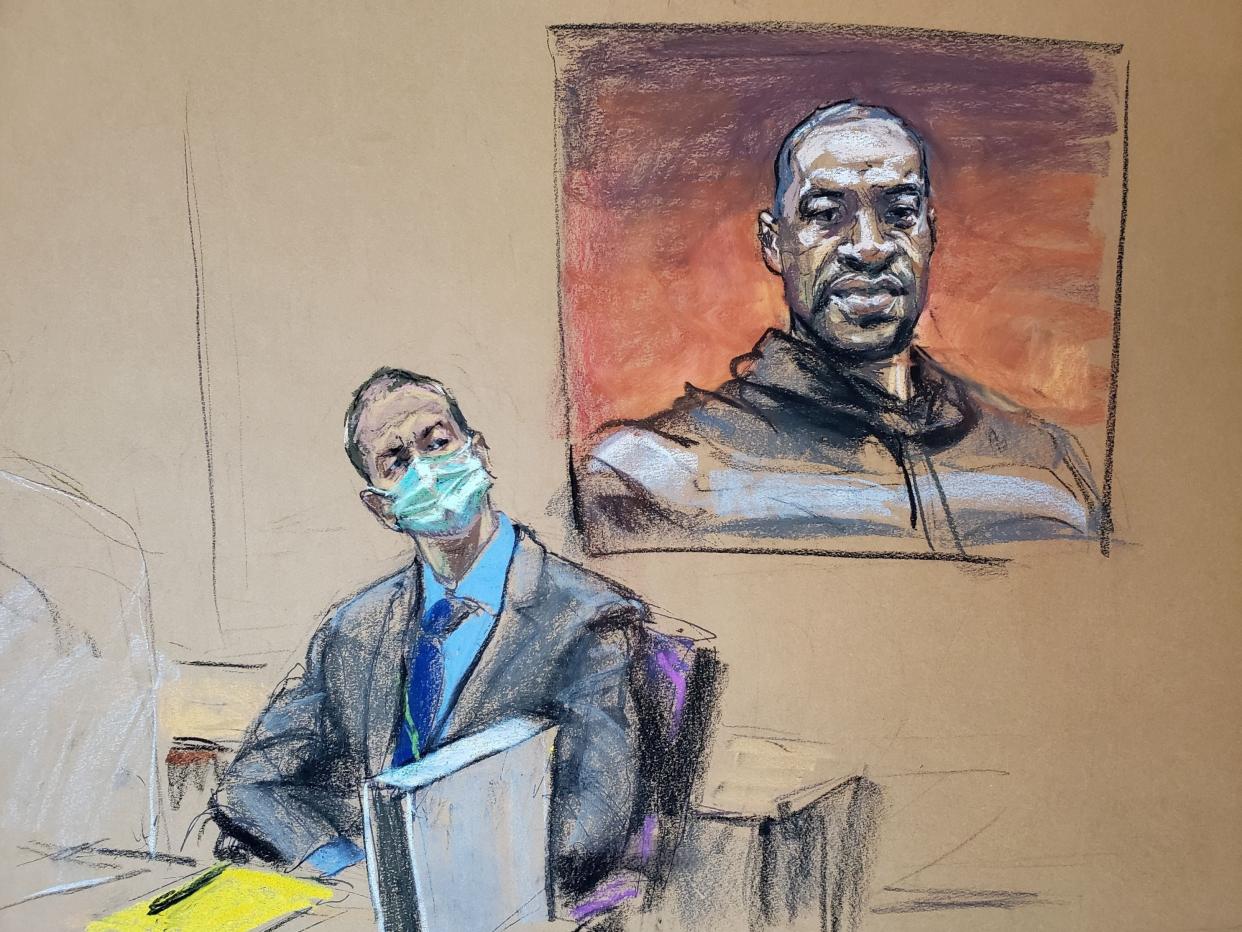Derek Chauvin trial: When will we have a verdict?

Former Minneapolis police officer Derek Chauvin sits in front of a picture of George Floyd displayed during Chauvin’s trial for second-degree murder, third-degree murder and second-degree manslaughter in the death of Floyd in Minneapolis, Minnesota
(Jane Rosenberg/Reuters)The trial of Derek Chauvin, the former Minneapolis police officer accused of murdering George Floyd, an unarmed Black man, last May, is nearing its end.
Closing arguments are set for Monday following three weeks of testimony, from which point the jury can begin deliberating.
The jurors will then be sequestered away from the outside world to decide on a verdict, which could take just a few hours or up to several weeks.
There is a large amount of witness testimony and evidence for the jurors to consider and it is unclear how long it will take the jury to announce a decision. Predicting the length of jury deliberations is difficult.
Last week, Judge Peter Cahill turned to the jurors and warned them to pack a bag when they returned on Monday. “If I were you, I would plan for long [deliberations] and hope for short,” he told them.
Mr Chauvin, facing three charges of murder, told the court he was invoking the Fifth Amendment right not to testify in the trial, as the defence started to conclude. He has been in court every day of the trial so far, although remained silent.
The charges against him — of second-degree unintentional murder, third-degree murder, and manslaughter — could carry 40 and 25-year sentences, respectively. He has pleaded not guilty to all three charges. A guilty verdict for each charge must be unanimous.
Mr Chauvin’s defence team is being paid for by the Minnesota Police and Peace Officers Association, as although he and three other officers were fired after Mr Floyd’s death, the Minneapolis Police Department still has a membership.
The defence argument centres on there being more factors to consider beyond video footage of Mr Chauvin kneeling on Mr Floyd’s neck during the incident on 25 May 2020.
“There is no political or social cause in this courtroom,” Mr Nelson told the court during the first week of the trial. “But the evidence is far greater than nine minutes and 29 seconds.”
Four officers were called to the scene on reports that George Floyd was using a counterfeit $20 bill. As Mr Chauvin detained Mr Floyd, he was filmed kneeling on the man’s neck while Mr Floyd pleaded for air and eventually lost consciousness.
“Derek Chauvin did exactly what he had been trained to do over his 19-year career,” Mr Nelson added. “The use of force is not attractive, but it is a necessary part of policing.”
The defence brought attention to Mr Floyd’s size, that he resisted arrest, and that he had drugs in his system at the time – which they argue were the cause of death when combined with his pre-existing health conditions.
The first medical expert called by the defence, Dr David Fowler. told the court on Wednesday that Mr Floyd died of combination of factors — including disease of the heart.
Forensic medical specialist Dr Bill Smock, arguing for the prosecution, told the court last week that “Mr Floyd died of positional asphyxia, which is a fancy way of saying he died because he had no oxygen in his body”.
Off-duty Minneapolis firefighter Genevieve Hansen said on day two of the trial that she pleaded with officers to check Mr Floyd’s pulse and was not permitted to give him medical attention.
There is extensive footage of her interaction with the officers, in addition to those of the other witnesses. Ms Hansen resorting to calling 911 to report the incident.
Another bystander, Donald Williams, also shouted at the police to get off Mr Floyd, but rejected claims by the defence team that he “grew angrier and angrier”. Mr Williams also called the police after the incident to report that officers had murdered Mr Floyd.
Darnella Frazier, the teenage girl who filmed the video in which Mr Floyd can be heard saying that he couldn’t breathe, said that the group of bystanders had become loud and called Mr Chauvin names, but no one threatened him and he did not seem scared by them.
The protests and unrest that followed the events of that day last summer renewed a nationwide reckoning around racism, policing, and civil rights that continues to this day.
Read More
Watch live as murder trial of Derek Chauvin continues
Biden administration warns of ‘consequences’ if Navalny dies – live

